QuestionRecently we found mites in the gecko tank, but the were contained on the wooden structures. After finding these mites we immediately trashed everything infested and cleaned the plastic items of the tank, and throughly cleaned the tank as well. We replaced the substrate and put both geckos back in (both are female, one is a year old, the other is going to be 3 next month). The 3 year old (she's albino) hasn't wanted to eat anything over the past week or two, which isn't like her. I was able to take a syringe and give her water, which I've been doing to make sure she does get liquid. She is still fairly active, and doesn't look like she's lost weight. I took her back home (45 minute drive) to better care for her, and take her away from the other leo. I'm not sure if she is sick, or just stressed or if there are other reasons for them not to eat. My first leopard gecko died of impaction, but was very slow and didn't want to do anything during the last few days of her life, so that didn't seem to fit whats wrong, nor do I use sand. She seems happy, but just won't eat.
AnswerHi Stace,
I'm sorry to hear about your first leo.
Good on the liquids...and good on not using sand!!
Did you also treat your geckos for mites? If not, a great product that I've had great results with is called "Healthy Habitat" which is made by a company called "Natural Chemistry" Its all organic. Its for both treating reptiles and their habitats..generally two or three treatments is suggested to be sure they are gone...the pesky little bugs!!
Geckos can go off food for a bit when we change anything in their homes. Even for 2 wks isn't unheard of. You can try enticing her with some nice wax worms... only a few though on occasion as they are very high in fat content.
You can also try some babyfood chicken from the syringe. She may need a boost in her gut bacteria which is needed for their digestion. To do this you can use human grade acidophilus capsules. You can add it to the water in the syringe..one capsule will give her a good solid 3 day regemine. You can also purchase Bene Bac, nutri bac or acidolphliz+ which contain acidophilus.
You can also double check your temperatures (warm area at 88-92 degrees)and cooler daytime area of low to mid 80's
Changing things in the tank can really mess up the temps also.
With her active and acting normal other than eating she is probably just unhappy about changes that were made. Of course if she shows signs of any problem, its vital to get her checked out by a vet. One other thought..are you 100% positive your younger one is a female? If not, you may have a gravid(with eggs) older leo in which case, if she is forming eggs, she wouldn't have as much room for food. With leos, a neat thing is you can actually see the eggs through their skin on the underside of their bellies!!
I've included a basic care sheet on the leos which includes links to finding a vet that can care for reptiles and also links to more information on the leos.
BASIC CARE FOR A LEOPARD GECKO
Leopards are pretty easy to care for but they do need
special care. Here are some of the basic needs of your
gecko.
HOUSING: The need to have at least a 20 gallon long tank for
one Leo. This needs to have a secure fitting screen top...they can be quite the escape artists!!! They need to have a humid hide box.You can make
this with something as simple as a small plastic dish with a
hole cut in one side and a small mesh bag filled with some
Sphagnum moss, coconut bark or Peat moss that you mist.
I made mine out of the small plastic folgers coffee containers...I cut an opening in the lid..and put the moss in..they LOVE it. I use the terrarium moss in mine.
I use that on the warm side of the tank. Be sure to provide a cool hidebox on the other end. I also provide a mid temperature hide...which is in the middle of the tank.I use the critter caves which you can purchase. NOT the ones that have heat in them!!!!
Provide secure climbing areas for your gecko. Fake plants, rocks and branches are all fine to use. be sure there are no wires or sharp ends to any fake plants you use.
SUBSTRATE:(that's the stuff on the floor of your tank) News
paper, lizard carpet or paper towels work great and are easy
to clean and are much safer than any loose substrate. Sand or other loose substrate is not recommended as that they can be deadly to the leo when it is ingested(eaten, even by accident while eating their insects)...
TEMPERATURES: They need a warm area of 88-92 degrees and a
cooler area in the upper 70s, low 80s. At night their
temperature can drop to the low to mid 70's.
Never use a hot rock for a leopard gecko...or any reptile.
They can severely burn any reptile. You can use a heating
pad under the tank,under tank heater, or you can use a regular household
lightbulb in a dome fixture with a ceramic socket in it to
keep the warm area at the 88-90 degree area.At night, no white light. If room temperatures stay above 70 degrees, no extra night heat is needed. The undertank heater or heating pad should cover about 1/3 of the tank....be sure to raise the tank up about 1/4-1/2 inch off the stand when using an undertank heat source to prevent heat build up which can cause the glass to break and hot spots in the glass. Be sure to have a good layer of newspaper, carpeting or, even a thin flat rock(such as tile) on top the area that the undertank heat source is placed...if you use a thin rock or tile, it helps to distribute the heat very well.
You can use the special nighttime lights that are designed for reptiles. I like using a ceramic heat emitter on a thermostat for nighttime heat.
DO NOT use black lights or party lights as they can cause eye damage!!!!
The wattage you use will vary based on room temperature and size of tank.
LIGHTING: Leopard geckos do not need UVB lighting but it does not hurt them to give them uvb. They should have some type of light during the day, be it a uvb tube, regular florescent light, reptile day light or regular household lightbulb. NO white lights at night!!!
FEEDING: Geckos should not be fed crickets or other insects that are bigger than the space between their eyes. Crickets and other food items such as silk worms, super, and an occasional treat of a wax worm, need to be dusted with a calcium supplement two times a week and also they should have a small dish of calcium in their tank. I use the lid of a milk jug for the little dish of calcium in their tank. For dusting the insects, Use a calcium with no added phosphorus.
Insects must be gut loaded(fed) for at least 48 hours prior to feeding your gecko. Remove any uneaten crix or superworms after 15-20 minutes..... Place a piece of cut potato in the tank so that if you have missed any uneaten insects, they will eat the potato instead of nibbling on your gecko!!!
You have to be sure to feed your crickets the right foods
before feeding them to your gecko. If your crickets/insects are not healthy and well fed, your gecko will not get the nutrition
he needs. You can gut load your crickets greens, veggies, cereals or specially designed commercial foods for crickets or the insects you are feeding.
Be sure to have a small dish of clean water for your gecko
at all times!!
You can offer them some baby food or fruits on occasion ...
Mine will even eat a small piece of watermelon now and then.
WATER: always provide a dish of drinking water. If you choose to mist your gecko to drink, its best to not get the tank too wet as that they do not do well with higher humidity. Sometimes its better to take your leo out of their tank to mist them to get them to drink!!!
HANDLING: Some geckos enjoy being held...others prefer not to be handled at all. Be sure to be very gentle when holding your leo and NEVER grab them by the tail! Their tails are extremely fragile and will break.
I do suggest finding a vet that can treat reptiles BEFORE you actually need one!!! To find a vet that is able to care for reptiles:
http://www.anapsid.org/vets
http://www.arav.org/Directory.htm
For more information on leopard geckos:
http://www.thegeckospot.com/leocareindex2.html
http://www.drgecko.com
If you have any more questions, or don't understand something, please let me know!!

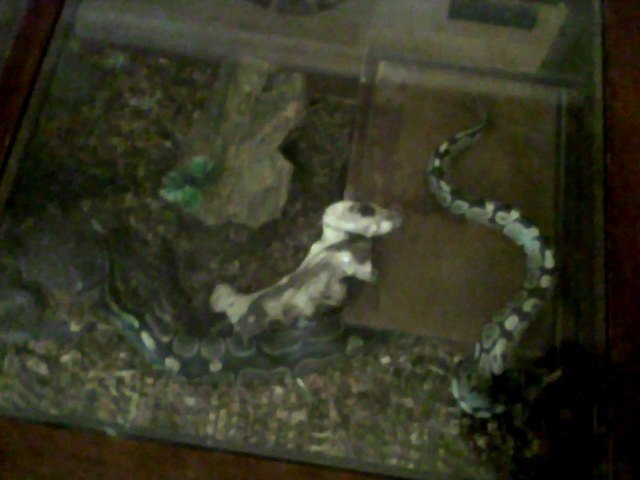 Ball Python heating pad
Question
Cage
I have two ball pythons right now,
Ball Python heating pad
Question
Cage
I have two ball pythons right now,
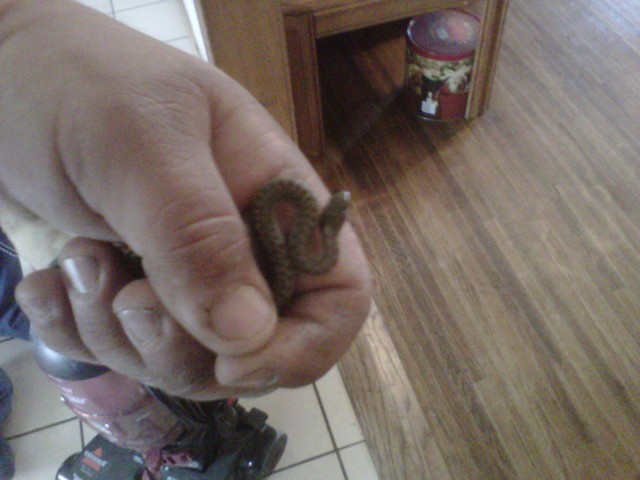 We have alot of snakes what are they?
Question
Is it dangerous?
My Husband has found several
We have alot of snakes what are they?
Question
Is it dangerous?
My Husband has found several
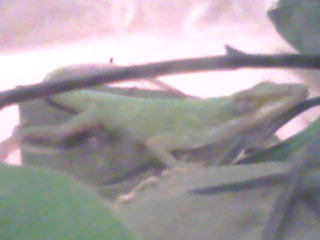 I think my Green Anole is sick
QuestionQUESTION: I have noticed two days ago that my a
I think my Green Anole is sick
QuestionQUESTION: I have noticed two days ago that my a
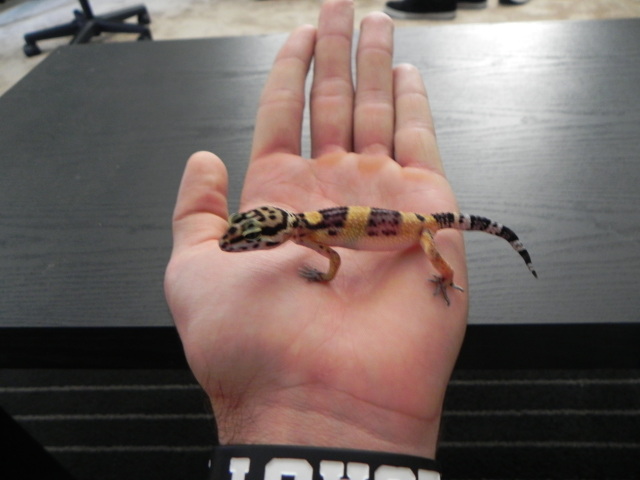 Leopard Gecko... Parasites ?
QuestionMy Gecko
QUESTION: HI Tracie,
I recentl
Leopard Gecko... Parasites ?
QuestionMy Gecko
QUESTION: HI Tracie,
I recentl
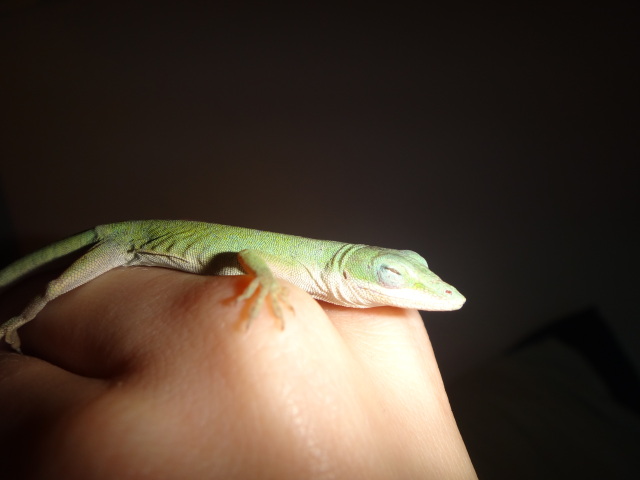 Green Anole with possible eye infection
QuestionQUESTION: I have 5 anoles in a 20 gallon tank w
Green Anole with possible eye infection
QuestionQUESTION: I have 5 anoles in a 20 gallon tank w